The Acolyte Ep5 debuts an alluring new villain.
In which I dissect the ideology behind the mask.
The Short Take:
A propulsive, unrelenting Star Wars spectacular. I’m still recovering. A top tier villain made by a top tier performance. (And writing! I talk a lot about the writing below.)
[SPOILER ALERT: Do not venture further into this maddening jungle if you have not seen The Acolyte up through Episode 5, “Night.”]
Image Credit: IGN
The Long Take:
I’ve only just picked myself up from fainting. I cannot recall a time when my mouth was this agape, my nerves this frayed. This episode dazzled me with stunning fight choreography and wholly revoked my sense of narrative security. (Jecki!?! And Yord?! Noooooooo.)
It also introduced a new all-timer of a villain. And I think that is the key to unlocking the success of this episode, which not only gives us impeccably executed, heart-stopping confrontations between multiple characters, but also uses the physical conflict to tell an emotionally heightened thematic story.
For context, I’ve always been a goodie-two shoes Light Side fan. In tabletop or video games, I never choose the Dark Side. My Funko Pop collection is very lopsided in how many Light Side vs. Dark Side characters it contains. I’ve opened at least five packages of those Star Wars Oreos and have gotten blue every single time. While I respect fans that gravitate toward Dark Side characters, whether they are adults with Vader bumper stickers or kids with Kylo Ren bicycles, I never really understood them. Those characters were bad, and I wanted to be good. It was that simple.
That shifted slightly once I met animated Darth Maul. He was still bad and I still wanted to be good, but he was also charismatic and funny. I never all out rooted for him, but I was always happy to see him and periodically felt sorry for him in a way that I never had for his live action counterpart. Prequel Trilogy Darth Maul is effortlessly cool and utterly menacing (see what I did there), but I never feel like I have access to his interiority. Similarly, when I see Original Trilogy Darth Vader in A New Hope, I am intimidated but feel no attachment. Once Luke saves him at the end of Return of the Jedi and once again when the Prequels introduce me to Anakin Skywalker, I begin to care more.
Sam Witwer’s animated Maul, on the other hand, feels used and betrayed by the Sith. He tries to warn Ahsoka about Order 66 during their duel. He blithely tries to adopt Ezra as his apprentice when Kanan is right there. He’s still scary, but he’s also a snake oil salesman with a little bit of Masterpiece Theatre thrown in. (And I only now just remembered that in Star Wars Rebels, Maul pretends to be a doddering, unassuming old man when he meets Ezra, similar to Qimir!)
Image Credit: StarWars.com
Scary is cool. Power inspires fear. But scary + a personality + inner pain? That equates to a villain that can really draw me in.
The Stranger, who, up until this episode, has either been called Qimir or The Master, elicits a similar response to animated Darth Maul: fear, but also amusement and empathy. I am trying to avoid saying I told you so as much as I can, but any discussion of The Stranger’s personality seems to necessitate retreading what I wrote about last week regarding the duality of his character. I predicted that The Stranger formerly known as The Master (at least in my writing) was in fact Qimir because it made sense to me that Mae’s master, who wishes to conceal his identity, would hide in plain sight with a harmless persona no one would suspect. And it made sense to me that Leslye Headland would cast Manny Jacinto to play such a character, since the actor, even by Headland’s own admission in interviews I’ve read recently, has demonstrated that he can play goofy, as he does on The Good Place, as well as frightening and villainous, as he does in a series called Nine Perfect Strangers.
The genius in The Stranger’s characterization upon reveal is that he still has a little bit of Qimir in him. When Sol asks, ““Why risk discovery?” his retort is a comic one: “Well, I…did wear a mask.” He’s having a bit of fun while also feeling big, dark feelings about the Jedi. Later, he delivers an extremely satisfying “here’s why I’m a villain” monologue in a way that makes me take him seriously, and yet throws so much shade at Sol in a way that entertains me to no end. As much as I love Sol and do not want anything bad to happen to him, I’m 100% here for these taunts. Not unlike Baylan Skoll in the Ahoska series (another fantastically complicated villain), Qimir/The Stranger seems to know exactly what nerve to press down on to cut Sol to the quick. This is quite the achievement considering that Sol comes across as one of the most caring and wholesome Jedi. (Despite harboring some kind of massive and likely morally questionable secret. Another achievement in character development and the moral complexity the show’s going for.)
Image Credit: IGN
These barbs were so incisive because each and every one throws the noble, heroic ethos of the Jedi back in Sol’s face. After the far too premature death of Jecki (which breaks my heart, but what a fireworks display of skill before she met her demise!), Sol, in anger, points to The Stranger’s cruelty by saying “She was a child.” The Stranger’s response once again shifts the blame back on Sol and the whole Jedi system of Masters and Padawans: “You brought her here.” This simple statement of fact calls out the faulty logic in Sol’s statement about Jecki being a child. Keep in mind that Yord says to Osha in a different scene that Jecki is a Jedi and therefore can take care of herself. According to The Stranger, both can’t be true. Either she has been trained to fight and came to Khofar accepting the risk in being a Jedi Padawan, or she’s a defenseless child and should not have been there in the first place. And if she were just a child and shouldn’t have been there, Sol and the Jedi are the ones who put her in harm’s way. Of course, Sol’s intention behind the comment could be more about grieving Jecki’s loss at such a young age, but, regardless, it’s very clever for Qimir/The Stranger to twist that into an indictment of the Jedi Order routinely training child soldiers.
Image Credit: Games Radar
The other clap backs have an even more personal bent with their “those who live glass houses shouldn’t throw stones” subtext. My favorite one is probably “I’ve accepted my darkness. What have you done with yours?” It, of course, is very specific to Sol, who, as we have heard repeatedly, “just needs to explain” what happened on Brendok. It’s becoming clearer and clearer that he is hiding some deep dark secret about the part he played in the Coven massacre. The Stranger seems to know somehow that Sol did wrong by Osha and Mae; whether that’s merely because Mae told him while studying with him, or because he can telepathically access Sol’s memories (cue the youngling saying “Fire! I see fire!”), or because he was in some way there that day, we’ll have to wait until future episodes to know.
But the pointed question has bigger, broader philosophical implications as well, because it accuses Jedi of repressing their dark feelings in a counterproductive way. The literal answer to “What have you done with yours?” is…pretend it’s not there. Stuff it down in a deep, dark place and forget it exists because you are good. You are a Jedi and can’t be dark.
In Star Wars, characters usually speak to a Galaxy-wide balance in the Force. There, of course, is the infamous Chosen One prophecy of who would bring balance to The Force and keep the dark side in check. Obi-Wan Kenobi screams in anguish at Anakin on Mustafar: “You would bring balance to The Force, not leave it in darkness!” And Jedi sometimes use the word balance to describe making connection with The Force. In The Last Jedi, Luke says that “The Force is not a power you have. It’s not about lifting rocks. It’s the energy between all things. A tension, a balance that binds the universe together.” The implicit premise of this notion of balance is that the Light and the Dark must both be present.
But what The Stranger says accuses the Jedi of not balancing at all. That there is only a binary of Light and Dark, good or bad. And to act in the name of the Light without acknowledging your darkness is at best denial and at worst fraud. Having recently seen Inside Out 2, I have emotional repression on the brain. There’s a way in which The Stranger is right, and that denying that you have any darkness at all — or in the case of Inside Out, any negative emotion like sadness — can be unhealthy or dangerous. Joy learns that trying to be happy all the time isn’t healthy because acknowledging your sadness can be cathartic and help you feel better. When Joy witnesses Sadness help Bing Bong cry, she begins to understand that avoiding sadness or bad feelings actually makes things worse rather than better. Could The Stranger be onto something here with Sol lying to himself and Osha all these years? Is the greatest folly of the Jedi that they have the hubris to think that darkness would never exist in their hallowed halls? That it shouldn’t? Have I too been wrong to disavow the Dark Side in my own expressions of fandom? Is the “those characters are bad and I want to be good” idea naively too simple?
Image Credit: Collider
The reveal of The Stranger confirms what had been my suspicion: that the inquisition of the Jedi Order, holding a mirror up to them, is the crux of the series. Leslye Headland has said that she sees the show as exploring the “Sith perspective.” And I think the different perspectives on the relationship between Light and Dark is the philosophical pivot point around which the Jedi and the Sith perspectives form here.
Only, The Stranger would not actually call himself a Sith. Now, I know that there are lots of theories proliferating on the Internet about how maybe this is because The Stranger classifies himself as Ren, being a progenitor of the Knights of Ren and Kylo Ren that we see in the Sequel Trilogy. That would be cool, of course, but I think the disavowal of the name Sith might speak more to this philosophical debate about the Light Side and the Dark Side — a rejection of the balance in the Force purely being based on a strict binary of two mutually exclusive sides. My interpretation of The Stranger saying “I have no name. But a Jedi like you might call me…Sith” feels like it classifies Sith as Jedi language and not his own.
When I teach college freshmen about academic writing, I often have to teach them this method by scholars Birkenstein and Graf called They Say, I Say. The idea is that you always have to attribute ideas that are not your own to other scholars, even generically by saying “scholars say,” to distinguish others’ ideas that you have come across in your research from your own original ideas or response to that research. The Stranger uses this technique here, saying that the Jedi might call me a Sith, but I do not give myself a name because I believe that the Jedi/Sith binary is too simplistic and rigid.
Perhaps, to go even further, the term Sith was the Jedi’s way of labeling those who do not adhere to their own edicts. Those who are not allowed to use The Force, like Mother Aniseya’s Coven. Institutions of power often enforce their own language on others, and when everyone adopts that language, they forget the assumptions and values encoded in that language are subjective. So even saying Sith could play into the Jedi-specific approaches to The Force and the idea that they are the only ones allowed to use it.
When Sol asks the Stranger what he wants, after all, he answers not with “more power” or “to rule the entire galaxy.” He says he wants freedom. More specifically, he says,
“Freedom. Freedom to wield my power the way I like. Without having to answer to Jedi like you. I want a pupil. An Acolyte. …But this one…went back on our deal. She exposed me. So now I have to kill every single last one of you. I don’t make the rules. The Jedi do. And the Jedi say I can’t exist. They see my face, they all die.”
The political allegory here is a little sticky because on the one hand, people having freedom unless you’re an authoritarian dictator, is good. And yes, everyone should have access to The Force; using it shouldn’t be exclusive to one group of people. On the other hand, “freedom to wield my power the way I like” isn’t okay if the way he likes it is to murder everyone who bothers him. We’re getting into basic ideological debates about what freedom actually means and what restrictions a government or institution can reasonably place upon that freedom for the protection of others. (See legal definitions of freedom of speech, for example, which is far more nuanced than you can say whatever you want.)
But that’s what makes a villain great as opposed to just good. What they say makes sense and lulls you into a sense of agreement until you remember that they’re going about putting theory into practice in a way we can’t morally condone.
The twistiest layer of this monologue in that sense is when The Stranger uses the logic of the Jedi against them. That their presumption of being the only ones who can use The Force is so strong that their worldview does not account for someone like The Stranger to exist. And if they say he can’t exist, then he must conceal all knowledge of his existence from the rest of the world. Which then, according to his own logic, justifies the killing of everyone who has seen his face. The statement “I don’t make the rules. The Jedi do” conveniently absolves him of all responsibility for his actions. It’s an acrobatic rationalization for killing nearly a dozen Jedi. Again, it’s top tier villain monologuing because you’re kind of nodding and nodding and then catch yourself in a double take and say, “wait what?”
I suppose all this, in some ways, is to defend the “but it was so obvious” critique of this week’s revelation. I agree that Qimir being The Stranger was very explicitly telegraphed, but, honestly, I didn’t mind at all after this episode because the character we got to meet — as well as Manny Jacinto’s break-through-the-stratosphere performance — was so, for lack of better word, awesome. He achieved animated Darth Maul levels for me in his brooding swagger, his playful guile, and his morally ambiguous ideology. And Jacinto delivers this new Star Wars villain with the perfect intensity and nuance the character needs.
Image Credit: Screen Rant
Look at that. I didn’t even have to mention his bulging biceps (which we should all appreciate).




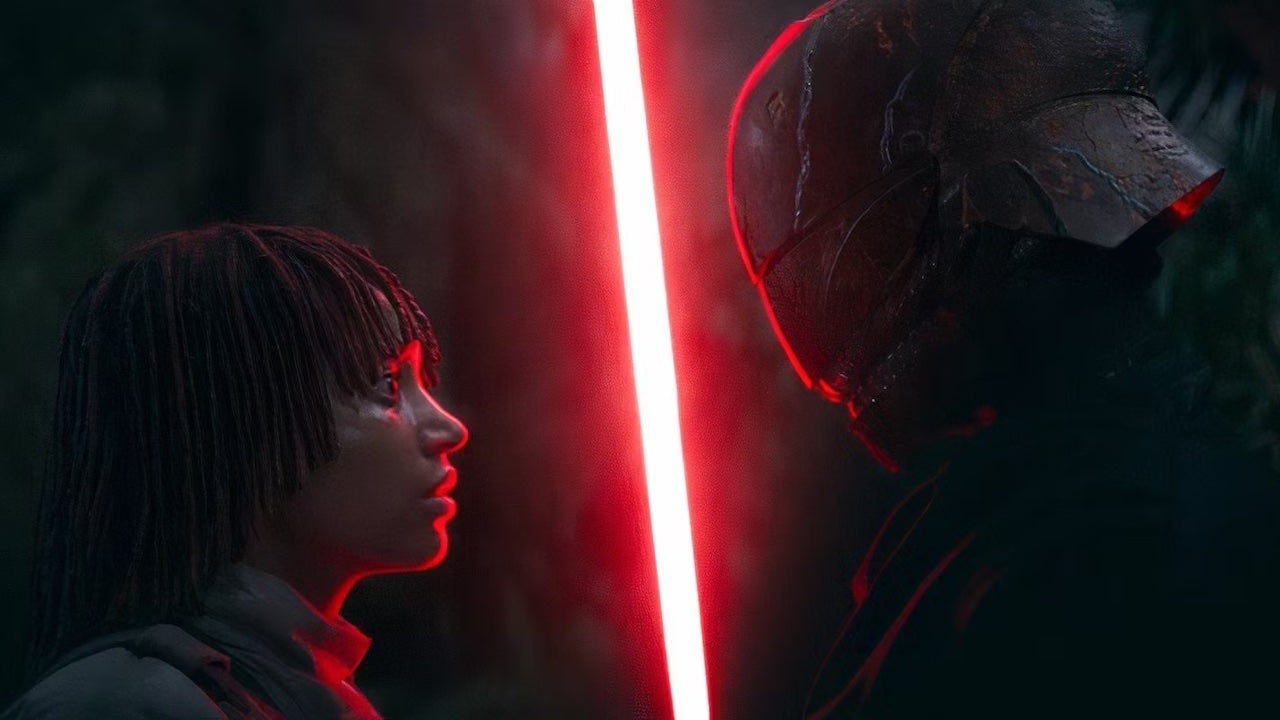

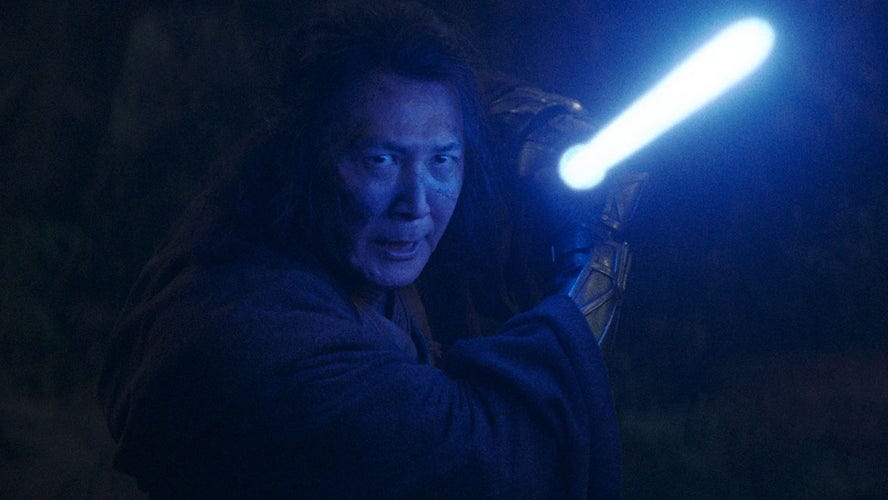
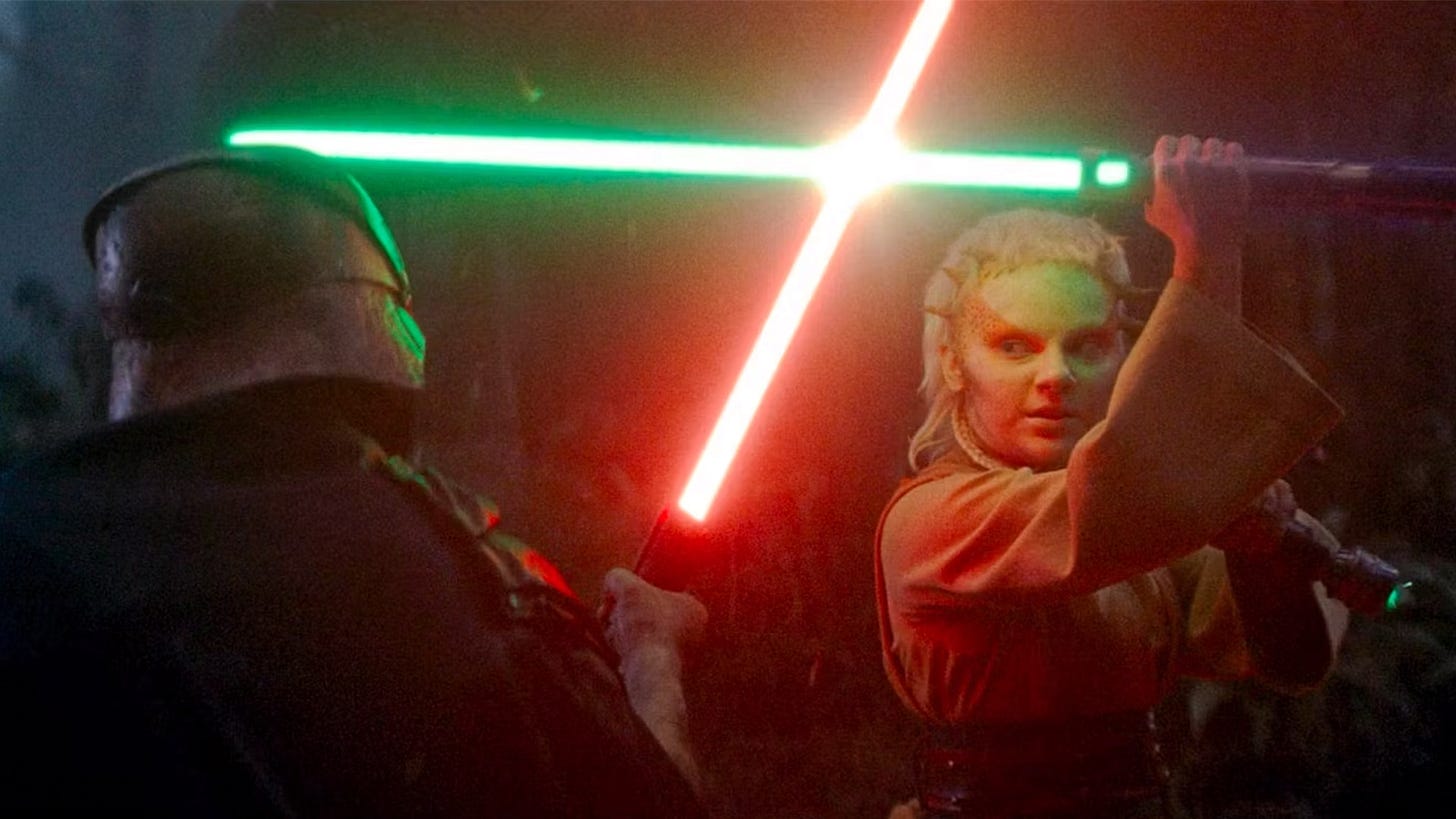
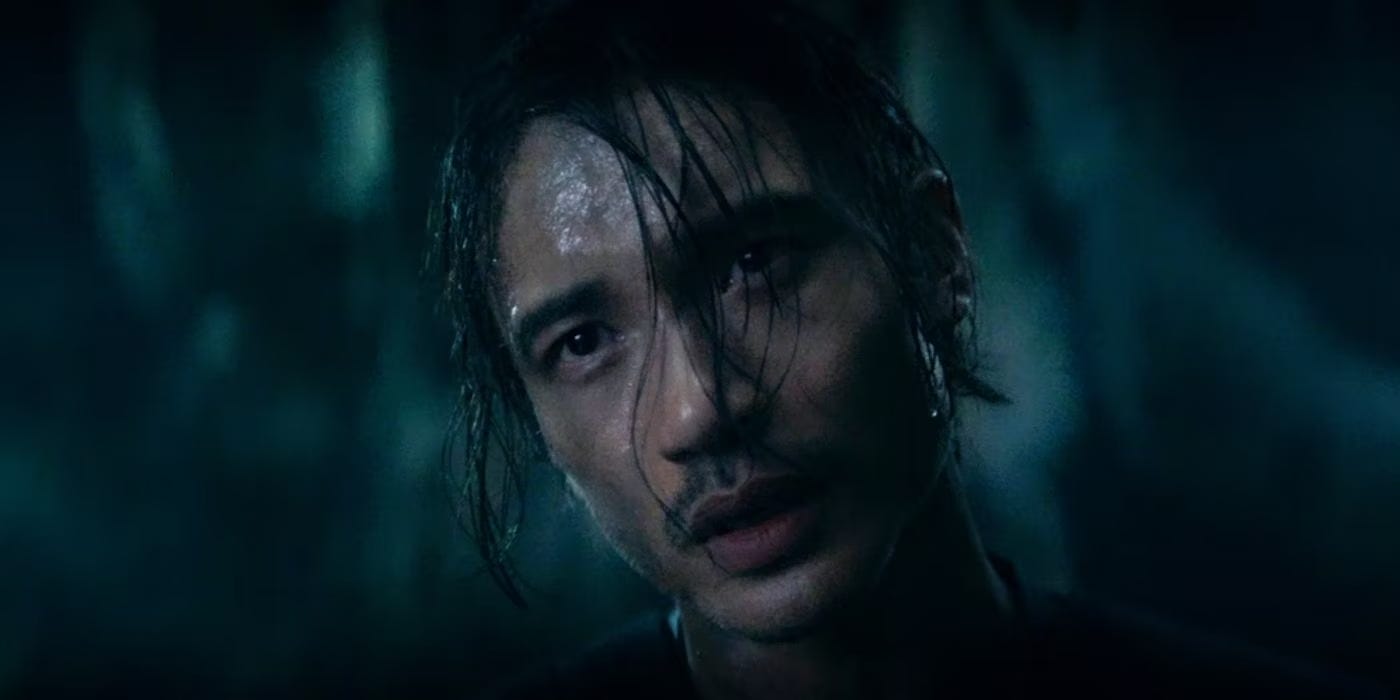
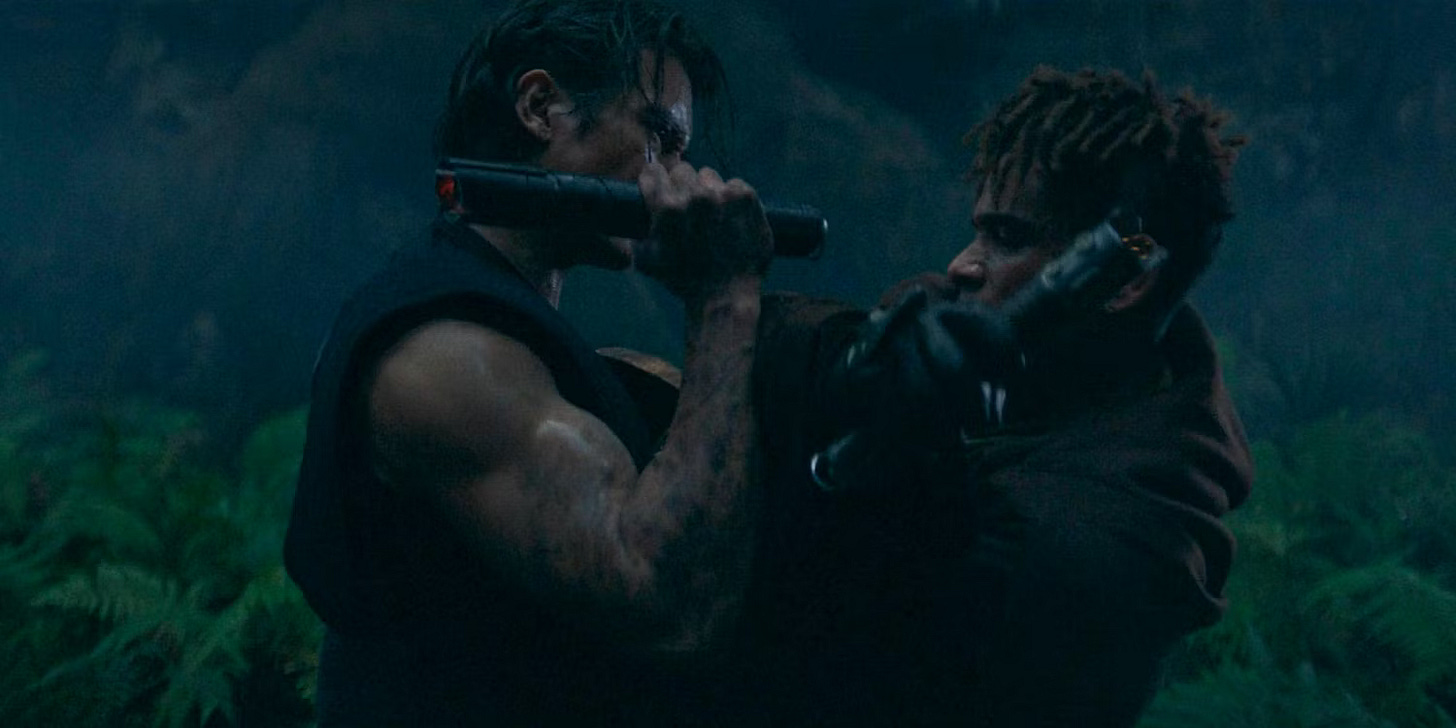
we finally got a masked character reveal! and it was a super cool and tense episode. They did an amazing job and raising the stakes in this episode and actually making us worry about the characters. Loved watching the lightsabers short circuit when they hit the metal. Great way to break up the action.
I love the piece! Thanks for expressing more than I was able to! I was kind of just like "a----whoooa!"